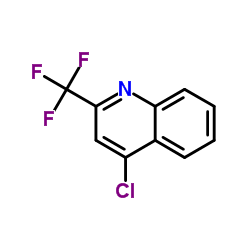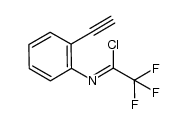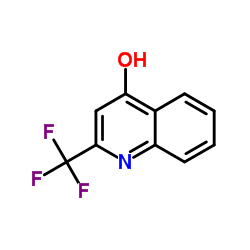4-Chloro-2-(trifluoromethyl)quinoline
Modify Date: 2025-08-25 13:57:26

4-Chloro-2-(trifluoromethyl)quinoline structure
|
Common Name | 4-Chloro-2-(trifluoromethyl)quinoline | ||
|---|---|---|---|---|
| CAS Number | 1701-24-2 | Molecular Weight | 231.602 | |
| Density | 1.4±0.1 g/cm3 | Boiling Point | 236.4±35.0 °C at 760 mmHg | |
| Molecular Formula | C10H5ClF3N | Melting Point | 31-33°C | |
| MSDS | Chinese USA | Flash Point | 96.8±25.9 °C | |
| Symbol |

GHS07 |
Signal Word | Warning | |
| Name | 4-Chloro-2-(trifluoromethyl)quinoline |
|---|---|
| Synonym | More Synonyms |
| Density | 1.4±0.1 g/cm3 |
|---|---|
| Boiling Point | 236.4±35.0 °C at 760 mmHg |
| Melting Point | 31-33°C |
| Molecular Formula | C10H5ClF3N |
| Molecular Weight | 231.602 |
| Flash Point | 96.8±25.9 °C |
| Exact Mass | 231.006256 |
| PSA | 12.89000 |
| LogP | 3.94 |
| Vapour Pressure | 0.1±0.5 mmHg at 25°C |
| Index of Refraction | 1.555 |
| InChIKey | ONNDFDQMHCNEGF-UHFFFAOYSA-N |
| SMILES | FC(F)(F)c1cc(Cl)c2ccccc2n1 |
| Storage condition | 0-10°C |
| Symbol |

GHS07 |
|---|---|
| Signal Word | Warning |
| Hazard Statements | H315-H319-H335 |
| Precautionary Statements | P261-P305 + P351 + P338 |
| Personal Protective Equipment | dust mask type N95 (US);Eyeshields;Gloves |
| Hazard Codes | Xi:Irritant; |
| Risk Phrases | R36/37/38 |
| Safety Phrases | S26-S36/37/39-S37/39 |
| RIDADR | NONH for all modes of transport |
| HS Code | 2933499090 |
|
~84% 
4-Chloro-2-(tri... CAS#:1701-24-2 |
| Literature: Isobe, Akira; Takagi, Jun; Katagiri, Toshimasa; Uneyama, Kenji Organic Letters, 2008 , vol. 10, # 13 p. 2657 - 2659 |
|
~% 
4-Chloro-2-(tri... CAS#:1701-24-2 |
| Literature: Australian Journal of Chemistry, , vol. 46, # 1 p. 21 - 29 |
| Precursor 2 | |
|---|---|
| DownStream 1 | |
| HS Code | 2933499090 |
|---|---|
| Summary | 2933499090. other compounds containing in the structure a quinoline or isoquinoline ring-system (whether or not hydrogenated), not further fused. VAT:17.0%. Tax rebate rate:13.0%. . MFN tariff:6.5%. General tariff:20.0% |
| MFCD00153105 |
| Quinoline, 4-chloro-2-(trifluoromethyl)- |
| 4-Chloro-2-(trifluoromethyl)quinoline |



